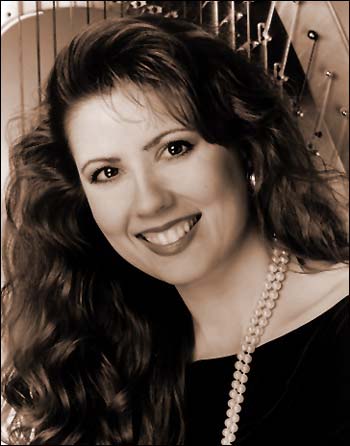

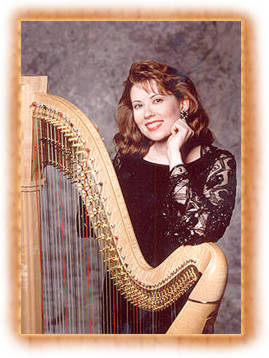 YK: Oh, there are an infinite
number of styles and kinds and
types of instruments, and styles of music! There's a great
movement of folk and Celtic harp music.
YK: Oh, there are an infinite
number of styles and kinds and
types of instruments, and styles of music! There's a great
movement of folk and Celtic harp music.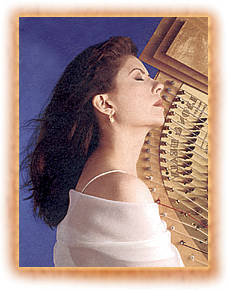 YK: I think it just takes
harpists getting out there and playing
it. The harp is a challenge on several levels. As a
soloist, I've had to not only convince people that I'm the harpist they
wanna hear, but before I ever get to that, I have to convince people
that the harp can be a great many things and expose a great many
dimensions that go beyond the stereotypes of the heavenly, angelic kind
of salon instrument. The harp can be very powerful, very
passionate, very colorful. It's almost a matter of selling an
audience on the idea of the harp before you ever get to the idea of
selling them on you as an artist. So it's a challenge!
YK: I think it just takes
harpists getting out there and playing
it. The harp is a challenge on several levels. As a
soloist, I've had to not only convince people that I'm the harpist they
wanna hear, but before I ever get to that, I have to convince people
that the harp can be a great many things and expose a great many
dimensions that go beyond the stereotypes of the heavenly, angelic kind
of salon instrument. The harp can be very powerful, very
passionate, very colorful. It's almost a matter of selling an
audience on the idea of the harp before you ever get to the idea of
selling them on you as an artist. So it's a challenge!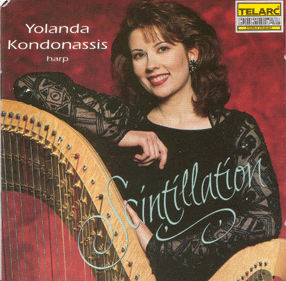 YK: That's a good
question! I would say no, I don't because
the microphone is very intimate. The microphone picks up every
breath, every swish of your foot. Every time you move your knee a
little bit against the wood of the harp, it's there. So my
approach is very intimate with the microphone, whereas in a hall you're
thinking projection; you're making sure that the nuances are all scaled
to the point where even the pianissimos are heard. So the range
is very different. I love both. I love being able to really
put it out there in performance, and I also love the freedom of total
intimacy with the microphone. You can do things that would be
lost in a concert hall.
YK: That's a good
question! I would say no, I don't because
the microphone is very intimate. The microphone picks up every
breath, every swish of your foot. Every time you move your knee a
little bit against the wood of the harp, it's there. So my
approach is very intimate with the microphone, whereas in a hall you're
thinking projection; you're making sure that the nuances are all scaled
to the point where even the pianissimos are heard. So the range
is very different. I love both. I love being able to really
put it out there in performance, and I also love the freedom of total
intimacy with the microphone. You can do things that would be
lost in a concert hall.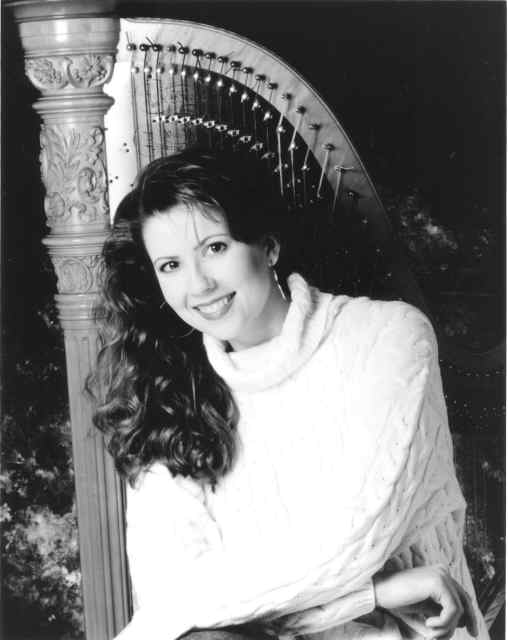 YK: Mmmmm! I think it
probably developed slowly so that it
almost creeps up on you. As a child, I loved it; I had a great
time with it. Of course the focus was on training and discipline,
and building the foundation. If you don't have that, then you're
struggling for the rest of your life. So I'm glad I spent those
years laying the concrete, but I would say during high school it became
something that I really knew I could not live without.
YK: Mmmmm! I think it
probably developed slowly so that it
almost creeps up on you. As a child, I loved it; I had a great
time with it. Of course the focus was on training and discipline,
and building the foundation. If you don't have that, then you're
struggling for the rest of your life. So I'm glad I spent those
years laying the concrete, but I would say during high school it became
something that I really knew I could not live without. 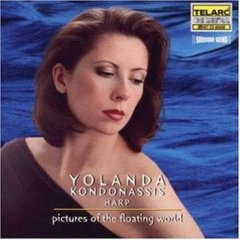 YK: [Thinks for a moment]
I won't say always, but I
think it helps. Definitely it helps to be able to understand
that compulsion we were talking about before. Each of us
understands
that even if we get home from traveling, a ten-hour day playing a
concert, it's
not crazy to either one of us that then we need to go sit
down and practice a little bit at 2 a.m. just so we touch base with our
instrument. [Both chuckle] That might be kind of hard for a
non-musician to understand.
YK: [Thinks for a moment]
I won't say always, but I
think it helps. Definitely it helps to be able to understand
that compulsion we were talking about before. Each of us
understands
that even if we get home from traveling, a ten-hour day playing a
concert, it's
not crazy to either one of us that then we need to go sit
down and practice a little bit at 2 a.m. just so we touch base with our
instrument. [Both chuckle] That might be kind of hard for a
non-musician to understand.This interview was recorded in Chicago on January 30,
1997. Portions were used (along with recordings) on WNIB in
1998. This transcription was made and posted on this
website in 2008.
To see a full list (with links) of interviews which have been transcribed and posted on this website, click here.
Award - winning broadcaster Bruce Duffie was with WNIB, Classical 97 in Chicago from 1975 until its final moment as a classical station in February of 2001. His interviews have also appeared in various magazines and journals since 1980, and he now continues his broadcast series on WNUR-FM, as well as on Contemporary Classical Internet Radio.
You are invited to visit his website for more information about his work, including selected transcripts of other interviews, plus a full list of his guests. He would also like to call your attention to the photos and information about his grandfather, who was a pioneer in the automotive field more than a century ago. You may also send him E-Mail with comments, questions and suggestions.